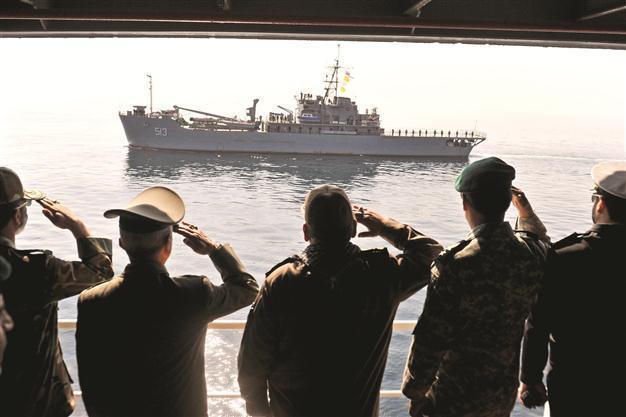‘Regional tensions’ delay US-Israel drill
JERUSALEM-ABU DHABI

Iranian Navy conducts naval wargames in the Strait of Hormuz on Jan 3. ABACA Press photo
Israel and the United States opted to delay a major joint military exercise because of regional tensions and instability, Israeli Foreign Minister Avigdor Lieberman said on Jan. 16.“The entire world understands that we had to postpone this exercise because of political and regional uncertainties, as well as the tensions and instability prevailing in the region,” Lieberman told public radio. “It’s only a delay, the exercise will take place by the end of the year,” he added, speaking from Warsaw where he was on an official visit. Speaking in Jerusalem at an Independence faction meeting, Defense Minister Ehud Barak noted later on Jan. 16 that talks with the U.S. on postponing the exercise had began a month ago.
“In recent days, we reached the conclusion that it would be right to postpone it, this will enable us to better prepare for it,” he said in comments relayed by his office. He added that the drill will probably take place in the second half of 2012, and constitutes “another layer of our deep and important security ties with the US.” On Jan. 15, a senior Israeli security official confirmed that the exercise, codenamed “Austere Challenge 12,” which had been scheduled for spring, was now being put back to late 2012.
The joint maneuver was to have been the biggest yet between the two allies and was seen as an opportunity to display their joint military strength at a time of growing concern about Tehran’s nuclear ambitions. But it was to come at a time of rising tensions over Iran’s nuclear program, which Israel, Washington and much of the international community believe masks a weapons drive. The United States is seeking tough new sanctions against Tehran, including its oil exports and financial institutions, and Iran has responded by threatening to close the strategic Strait of Hormuz.
UAE, Iraq urge end to Hormuz escalation
Meanwhile, The United Arab Emirates and Iraq on Jan. 16 called for an end to escalating tensions over Iran’s threat to close down the strategic Strait of Hormuz, a move that would affect their economies. “Iraq is against escalation and against dealing with these differences using military force but with dialogue,” Foreign Minister Hoshyar Zebari told reporters at a joint news conference with his Emirati counterpart in Abu Dhabi. “There is a major confidence crisis with Iran and we also see ourselves as a country that overlooks the Gulf and is definitely affected by tension and escalation,” Zebari said, adding 90 percent of Iraqi oil exports pass through Hormuz. Emirati Foreign Minister Sheikh Abdullah bin Zayed al-Nahayan echoed Zebari’s fears. “Any talk on waterways and especially Hormuz has an effect on us,” Sheikh Abdullah said. “We will do everything possible to defuse the crisis.” “I don’t think the escalation will serve the region or the markets’ stability,” he added.
Compiled from AFP and AP stories by the Daily News staff.
















